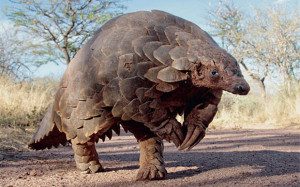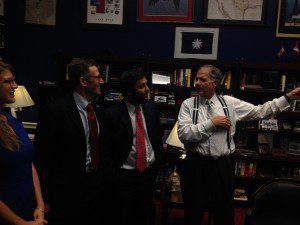While the lead up to tenure is often terrifyingly stressful, even attaining that goal is a bit daunting as it raises the question, “Now what?” I suppose on some level one can then set one’s sights on the next thing, Full Professor, but that obviously doesn’t have the same significance in terms of career and life trajectory that tenure does. Getting tenure raises all sorts of questions about what you want to be when you grow up, if a life in the academy makes you happy, or if the kind of life you are leading in the academy is what you want to be doing.
When I first started graduate school, I had no intention of going in to academia, though it is the family business. No, as I told my designated mentor on the first day of graduate school, the veteran comparativist Sam Barnes, “I want to run for Congress and if that doesn’t work out, I will teach.” Pretty clueless. As Dan Drezner has pointed out, the gravitational pull of universities is strong for those pursuing a PhD, and I succumbekd to the temptation to go into academia with the continuation of the same kinds of incentive structures I was familiar with from before, get publications out replaced get good grades. Aim for a top 3 journal! Try to get the citation count up! I had the nagging suspicion that there is more to life than that and more out of this episode experience that I had to have if I wanted to stick with it.
I made the decision upon getting tenure that I wanted to teach and work on issues that I cared about. While that was always true before, I had less flexibility in terms of teaching choices. I was a price-taker: we need you to teach a writing class so here you go. After tenure, I made the choice that I wanted to teach a mix of classes, one that obviously the school needed and others that I needed. I was an environmental activist and development campaigner twenty years ago in college (and indeed knowledge of that space greatly informs my scholarly interests in social movements). I often ask myself, would my 20-something self be proud of the person I have become? Sometimes, in the slog for tenure, publications, and provincial university politics, you can lose track of what is important.
How to Stay True to Your 20-Year Old Self
At our graduate policy school, we have a year long practicum for a client. While not unique, it feels like something distinctive and important. A client pays some pot of money for an intellectual product that they have a hand in designing. A team of 15 or so graduate students works diligently on that project for an entire academic year, including fieldwork, elite interviews, and whatever other methods and products are demanded by the client and appropriate to the task at hand.
Two years ago, I did one of these on climate change and the major economies. I had a notional client and a bit of money. We wrote some interesting sectoral and country papers on a variety of themes. It was rewarding but something of a grind. I had only done one of these before. We didn’t quite have the investment of the client that was needed. Something did not quite click, and the students punished me for it on the evals, though I think the intellectual product is ultimately quite interesting. That, coupled with other feedback from another course, left me last year feeling a bit wounded, that I had tried something new and different and challenging, and it wasn’t working quite right.
 This year, I had a theme as equally important to me, if not more so – global wildlife conservation (course blog here). I blogged about it last week on the Duck, and I will continue to beat the drum on that topic as it is existential crisis for iconic wildlife like elephants, rhinos, and the funky little pangolin, pictured left. It just pains me to think that species that have been around for thousands of years are being killed to become tchotchkes or ground up into powder as a hangover cure. (As an aside, I had a vigorous comment discussion with former Duck contributor Yikash Yadav who suggested my concerns were indicative of a “neo-imperialist” impulse. I vigorously disagreed with him, but that is what blogging, in its best sense, can be about. Disagreeing without being disagreeable.)
This year, I had a theme as equally important to me, if not more so – global wildlife conservation (course blog here). I blogged about it last week on the Duck, and I will continue to beat the drum on that topic as it is existential crisis for iconic wildlife like elephants, rhinos, and the funky little pangolin, pictured left. It just pains me to think that species that have been around for thousands of years are being killed to become tchotchkes or ground up into powder as a hangover cure. (As an aside, I had a vigorous comment discussion with former Duck contributor Yikash Yadav who suggested my concerns were indicative of a “neo-imperialist” impulse. I vigorously disagreed with him, but that is what blogging, in its best sense, can be about. Disagreeing without being disagreeable.)
For the wildlife class, our client was the Congressional Research Service (CRS), a research arm that support the U.S. Congress with briefs and memos on a variety of topics, always with an even-handed survey of perspectives and policy options on different issues. They were really involved in the class, with two of their staffers traveling to Austin to meet with us twice over the course of the year, with rounds and rounds of line edits on our work.
We ultimately wrote 6 papers for them on a variety of topics, on the nature of demand for wildlife, on the security implications of the poaching crisis, on multilateral governance and a wildlife crime, on the implications of sport hunting, the role of ecotourism in conservation, and the scope for public-private partnerships in this space. The class culminated in a trip to DC with six students pictured above, where we presented our findings to the senior leadership at CRS, spent an afternoon discussing our findings with key wildlife conservation NGOs, and then spent a final day discussing our research with nine different Congressional offices from Texas, including a meeting with Congressman Ted Poe of Houston who had just hosted a hearing on poaching and terrorism the previous week (pictured right).
I have to say both the trip and the course were some of the most satisfying teaching moments of my career. The students learned a lot and, as my grandmother used to say, worked their tuchuses off. Several of them were able to travel to Tanzania and meet with ecotourism providers and see the wildlife first-hand. Others traveled to China and talked to NGOs and diplomats about how to curb demand. A third set of students went to Washington and met with officials at the National Security Council, the State Department, intelligence agencies and more. For some, it was the first time out of the country or the first time in DC.
Our efforts, I hope, in a small way contribute to successful efforts to prevent extinction of wildlife. It’s the kind of class that I know my 20-year old self would have been proud of, and it’s the kind of course that makes the journey after tenure worthwhile.
If you are interested, below are the collection of videos here and a link to the powerpoint of our final presentation, as well as testimony on wildlife crime and national security I submitted to Congress during our recent visit to Washington, DC.
Joshua Busby is a Professor in the LBJ School of Public Affairs at the University of Texas-Austin. From 2021-2023, he served as a Senior Advisor for Climate at the U.S. Department of Defense. His most recent book is States and Nature: The Effects of Climate Change on Security (Cambridge, 2023). He is also the author of Moral Movements and Foreign Policy (Cambridge, 2010) and the co-author, with Ethan Kapstein, of AIDS Drugs for All: Social Movements and Market Transformations (Cambridge, 2013). His main research interests include transnational advocacy and social movements, international security and climate change, global public health and HIV/ AIDS, energy and environmental policy, and U.S. foreign policy.


Thanks for posting this. Really worthwhile topic and inspiring approach. What professor-ing should be about – much more important than citation count!
Great and inspiring post Josh!
Seems to me this project is very much the sort of thing that students in a graduate policy-oriented school should be doing, and Prof. Busby shd be congratulated.